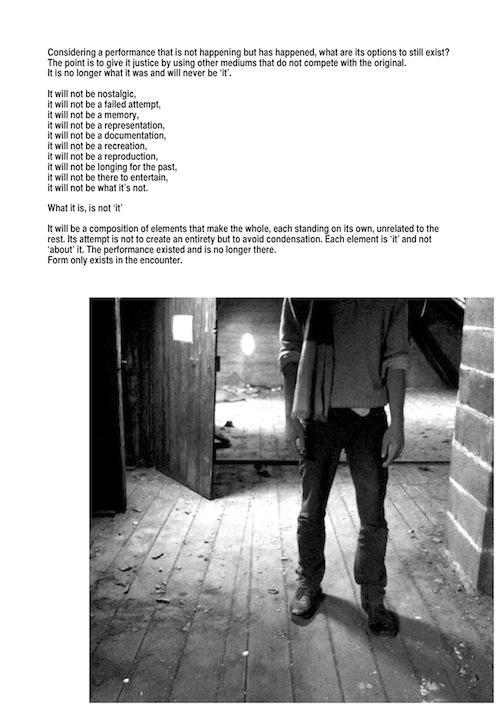What it is, is not “it”
PILOTENKUECHE East Side, Leipzig DE
Saturday 30.5.2015 in occasion of PALINDROM exhibition
3pm - 8pm
Free entrance
Event
The work exists in the traces of something that will not be. Imposing the moment but not its past or its future, missing out on information.
The show strives to open up possibilities for a space that has potential but will never become. Only by accident.
Considering a performance that is not happening but has happened, what are its options to still exist? It is no longer what it was and will never be ‘it’.
It will not be nostalgic, it will not be a failed attempt, it will not be a memory, it will not be a representation, it will not be a documentation, it will not be a recreation, it will not be a reproduction, it will not be longing for the past, it will not be there to entertain, it will not be what it’s not.
What it is, is not ‘it’
It will be a composition of elements that make the whole, each standing on its own, unrelated to the rest. It’s attempt is not to create an entirety but to avoid condensation. Each element is ‘it’ and not ‘about’ it. The performance existed and is no longer there.
Form only exists in the encounter.
The piece will exists in the formation (VS form) of dynamic relationships. The work wants to move towards the ‘improper’ territory of the frame, which does not define it but IS it. There is no stable IT to which any practical outcome will want to refer. The work will stand in the ITness, not the ABOUTness, evolving, expanding signification without ever defining IT.
It will not exist other than in the process of condensation that the encounter will provide:
“Condensation comes out of the nature of experience itself. Every experience has many factors “packed” into it. Every experience shows condensation. Every experience we have is packed full of meaning and feeling and thoughts and associations. Often there are multiple meanings and multiple feelings and so on. In a new environment, with new objects we have new experiences, and it is here we can see, by comparison, just how packed our usual experiences are. It is only by reflective analysis that individual parts of experiences can be “dissected” out and examined individually.” (from Hersh Thomas, R., Law of Condensation)



